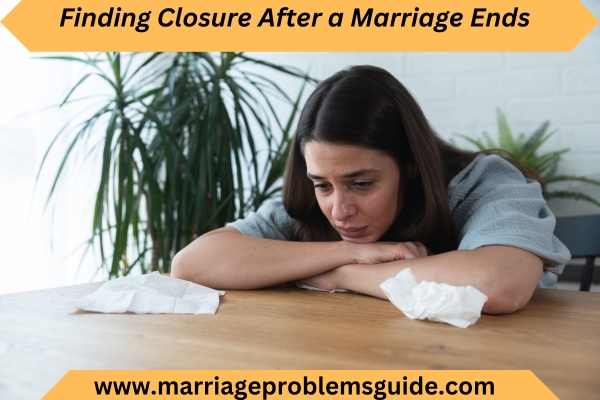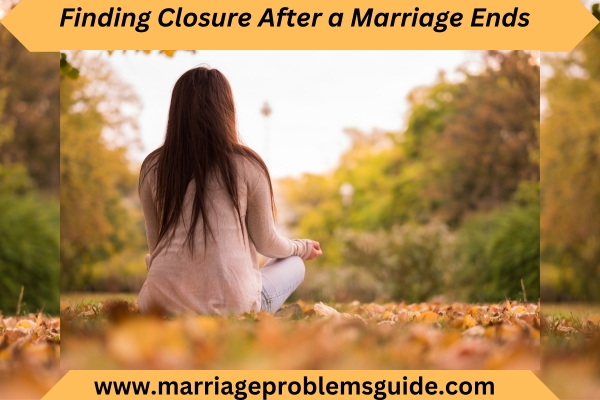Finding Closure After a Marriage Ends
Going through a divorce or separation can be an emotionally challenging experience. When a marriage that was expected to last forever comes to an end, it can leave you feeling lost, angry, and full of unresolved feelings.
Finding closure after your marriage ends is an important part of the healing process. This allows you to process the emotions, move forward, and start a new chapter of your life.
Why Closure Matters
Getting closure gives you a sense of resolution and the ability to let go. Without closure, you may struggle with recurring thoughts about your ex, have unanswered questions, or be unable to move on. Closure provides:
- Emotional release: Ending a marriage can bring up hurt, resentment, guilt, and regret. Gaining closure allows you to process these feelings so you can let go.
- Understanding: Closure gives you the chance to gain insight into why the marriage ended, see things clearly, and get the answers you need.
- Empowerment: When you have closure, you take back your power to move forward on your own terms instead of staying stuck in the past.
- Relief: Closure lifts the weight so you don’t have to carry the baggage of the marriage anymore. This brings relief and the freedom to move forward.

How to Find Closure
Ending a marriage can leave you with unresolved feelings, unanswered questions, and the inability to move forward. Finding closure is an important part of healing and being able to start a new chapter.
Here are some of the most effective ways to find closure after your marriage ends:
1. Cut Off Contact
Continuing to see or talk to your ex-spouse can reopen emotional wounds and prolong ties, making it hard to move on. Take time away from them so you can begin to heal.
Block or unfriend them on social media, delete their number from your phone, and ask mutual friends not to relay any information about them to you. Removing your ex from your daily life provides the space you need to process the end of the marriage and start to find closure.
2. Release Your Emotions
A marriage ending brings up intense emotions like hurt, anger, resentment, regret, loneliness, and more. Finding healthy ways to release and express your feelings is necessary for processing emotional turmoil and grief.
Let it all out by talking to close friends or family members, seeing a counselor, journaling, crying, creating art, or joining a divorce support group. Releasing pent-up emotions helps you start to find inner peace.
3. Get Professional Counseling
Working through your feelings with a trained therapist or counselor equipped to handle divorce recovery can help you find closure.
Through counseling, you can unpack emotions, gain insight into why the marriage dissolved, obtain tools to handle lingering anger or bitterness, eliminate obsessive thoughts about your ex, and get the support you need to move forward.
4. Write a Letter
Writing an unsent letter to your ex can help you say everything you need to say to them that you may not have gotten the chance to during the marriage or divorce. Pour your heart out in this letter, expressing your thoughts, feelings, regrets, realizations, disappointments, forgiveness, and goodbye.
The act of writing it all down can bring you closure, relief, and clarity. You can ritually shred or burn the letter when finished to symbolize letting go.
5. Have an Ending Ceremony
Creating a ceremony or ritual to mark the end of your marriage can help provide symbolic and spiritual closure. You can scatter roses, plant a tree, burn symbolic items from the marriage, meditate over your wedding ring before removing it, or create another meaningful ritual.
Honoring the transition into this new phase of your life brings closure.
6. Practice Self-Forgiveness
Let go of guilt or shame over your perceived role in the ending of the marriage by actively practicing self-forgiveness. Accept that you did the best you could with what you had at the time.
Have self-compassion and know you are only human. Forgiving yourself is necessary for finding closure.

7. Look Within
Take time for introspection about how going through a divorce has changed or shaped you. Draw wisdom from the experience that you can apply to your life moving forward.
Reflect on areas for personal growth and create a vision for the person you want to become in this next chapter. This brings closure through a changed perspective.
8. Set Clear Boundaries
If you have children with your ex and will remain in contact because of co-parenting, set very clear boundaries for interaction. Keep communication focused only on matters related to the kids. Avoid prolonged contact or discussions that prolong ties to the past. Healthy boundaries provide closure.
9. Go on Dates With Yourself
Do thoughtful, caring things for yourself that you wish your ex-spouse had done. Rebuild your sense of self-worth through self-care. Take yourself out on solo dates to your favorite restaurant, café, museum, or place in nature. Invest in yourself and have fun rediscovering who you are.
10. Remove Daily Reminders
Pack up old wedding photos, take off your rings, rearrange your living space, and remove other daily reminders of your married life. This helps reinforce closure by supporting the shift into your new normal. Out of sight can lead to out of mind.
11. Find Meaning in the Pain
Seeking purpose in a painful experience can bring closure through personal growth. Share your divorce story to support others going through breakups. Use your wisdom to guide newly single friends.
Help other women gain the courage to leave unhealthy marriages. Making meaning from your hardship aids healing.
Conclusion:
While it takes time and conscious processing, finding closure after your marriage ends is absolutely possible. Employing these strategies helps you gain understanding, shift perspective, handle lingering feelings in a healthy manner, remove daily reminders, and take back your power so you can move forward on your own terms. Learn here more about ending marriage guide and tips.


